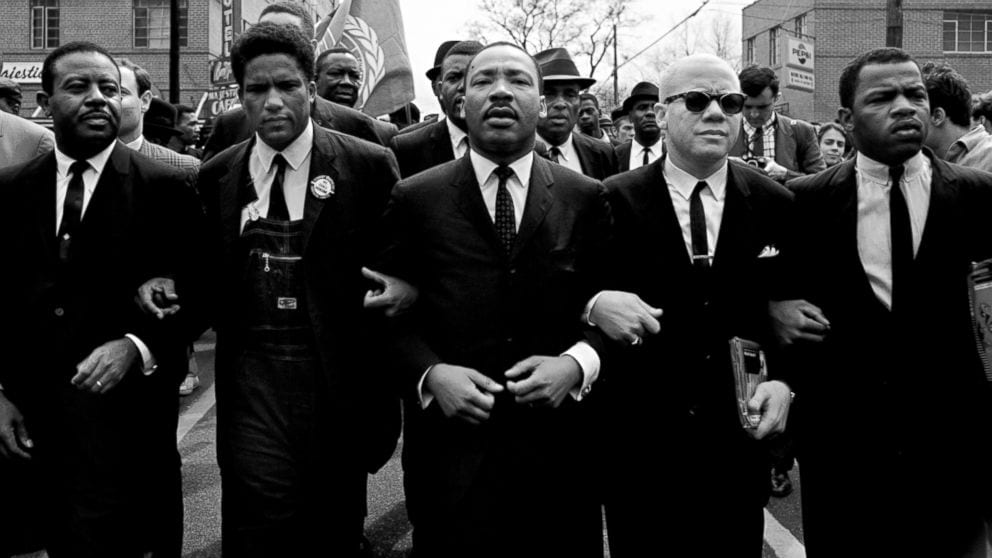
Monday, January 18, 2021 is Dr. Martin Luther King Jr. Day. A few celebrations will be happening around the Corridor area, mostly virtually (check our events calendar for details).
Martin Luther King Jr. was born on January 15, 1929, in Atlanta, Georgia, the second child of Martin Luther King Sr., a pastor, and Alberta Williams King, a former school teacher. In 1953 he married Coretta Scott and settled in Montgomery, Alabama, where King became pastor of the Dexter Avenue Baptist Church. The Kings had four children: Yolanda Denise King, Martin Luther King III, Dexter Scott King and Bernice Albertine King.

Dr. Martin Luther King Jr. was one of the most well known and revered civil rights activists, as well as being a Baptist minister. He was born Michael Luther King, Jr., but later had his name changed to Martin. Always a strong worker for civil rights for members of his race, King was, by this time, a member of the executive committee of the National Association for the Advancement of Colored People, the leading organization of its kind in the nation. According to History.com, he was at the center of the Civil Rights Movement, from the mid-1950s until his assassination in 1968.
One keystone event in the fight for civil rights led by Dr. Martin Luther King Jr. was the Montgomery Bus Boycott. In early December 1955, King accepted the leadership of this first
great nonviolent demonstration in the United States, with the boycott lasting 382 days, according to the Nobel Prize website. The boycott was a political and social protest campaign against racial segregation on the public transit system of Montgomery, Alabama. Because of this demonstration, the Supreme Court of the United States declared that the laws requiring segregation on buses was unconstitutional.
On April 12, 1963, Dr. Martin Luther King Jr. and nearly 50 other protesters and civil rights leaders were arrested after leading a nonviolent demonstration as part of the Birmingham Campaign, according to History.com. King was thrown in solitary confinement and was denied access to lawyers and contact with his wife. King wrote the impassioned defense of his nonviolent but direct actions known as the “Letter from Birmingham Jail,” which turned criticism upon the nation’s religious leaders and passive white Americans for being bystanders while King and others risked everything to stir change. Later that year, on August 28, Martin Luther King Jr. worked with a number of civil rights and religious groups to organize the March on Washington for Jobs and Freedom, a peaceful political rally designed to shed light on the injustices Black Americans continued to face across the country.
It was on this day that King delivered his stirring “I Have a Dream” speech that was broadcasted and captured the attention of people around the nation. Standing on the steps of the Lincoln Memorial – a monument to the president who a century earlier had brought down the institution of slavery in the United States – he shared his vision of a future in which “this nation will rise up and live out the true meaning of its creed: ‘We hold these truths to be self-evident, that all men are created equal.’” On October 14, 1964, Dr. Martin Luther King Jr. won a Nobel Peace Prize for his nonviolent resistance to racial prejudice in America. King was just 35 years of age, the youngest person ever to receive the award.
In the spring of 1965, captured on television, the brutal scene between white segregationists and peaceful demonstrators in Selma, Alabama, outraged many Americans and inspired supporters from across the country to gather in Alabama and take part in the Selma to Montgomery march led by King and supported by President Lyndon B. Johnson, who sent in federal troops to keep the peace. That August, Congress passed the Voting Rights Act, which guaranteed the right to vote – first awarded by the 15th Amendment – to all African Americans.

The events in Selma deepened a growing rift between Martin Luther King, Jr. and young radicals who repudiated his nonviolent methods and commitment to working within the established political framework. Through the final years of his life, King continued to spur change and initiate campaigns even as he faced threats and challenges. After visiting Memphis, Tennessee, in support of striking sanitation workers and after another celebrated speech, King was assassinated by shooter James Earl Ray on April 4, 1968. In the wake of his death, a wave of riots swept major cities across the country, while President Johnson declared a national day of mourning.
After years of campaigning by activists, members of Congress and Coretta Scott King, among others, in 1983 President Ronald Reagan signed a bill creating a U.S. federal holiday in honor of King. Observed on the third Monday of January, Martin Luther King Day was first celebrated in 1986.
